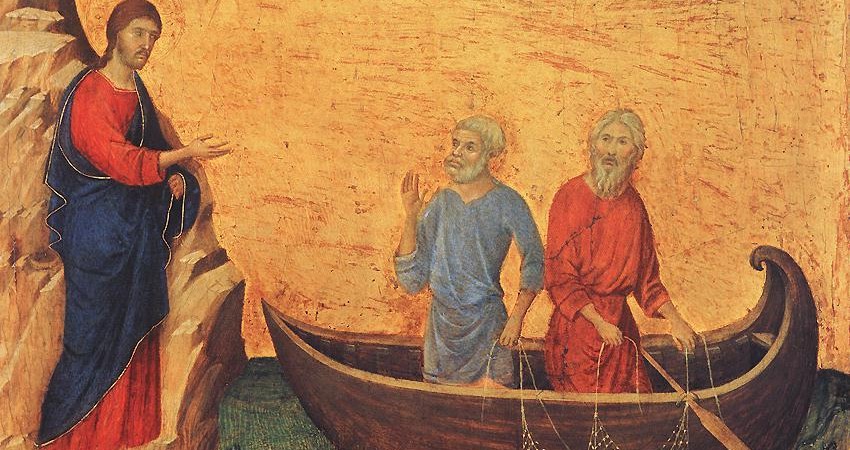
Yet more of my bullet points from the talk I gave on baptism…
+ + +
In baptism we are reborn, “born from above” (Jn. 3:3), “born of God” (Jn. 1:13). It is a mystical “hidden” birth that introduces us into the Trinitarian life as insiders, emboldened by the Spirit of the Son to cry out to the Father a child’s word only Jesus can rightly claim: “Abba!” United to the Son by grace, we come to know in baptism what it means to be “God from God, Light from Light, true God from true God, begotten not made…” Jaw dropping. We are made members of the family of God. We are children who, first loved into life by God in our mother’s womb, are loved again into new life in the womb of Mother Church. Baptism reveals to us the whole goal of all creation, captured in St. Ignatius of Antioch’s deeply moving words: “Within me is the living water which says deep inside me: ‘Come to the Father.’” Being born again also implies a whole new super-natural vision of life. “Do not be conformed to this world, but be transformed [metamorphousthe] by the renewing of your minds, so that you may discern what is the will of God—what is good and acceptable and perfect” (Rom 12:2). “Let the same mind be in you that was in Christ Jesus…” (Phil. 2:5ff). I know a man in Maryland who had a life-altering conversion to faith in Christ, and was baptized in the Catholic Church. He was a successful lawyer, single, and the first thing he did after his Easter initiation was set aside half of his income for alms. Sixteen years later, he still does. He said, “I am Zacchaeus.” In baptism we are also adopted as children into a family of God we may or may not like. Joyce had it right when he wrote, “Catholic means here comes everybody.” This is extremely important, and is why canon law (518) says that in general, as a rule, my parish is the church whose territory I live in. My parish is not the liveliest, most me-orthodox parish I decide I feel most comfortable in. When Jesus chose his disciples (Jn. 15:16), he thrust them together and commanded them then to “love one another.” Chesterton said it poignantly: “The Bible tells us to love our neighbors, and also to love our enemies; probably because generally they are the same people.” In a territorial parish, Providence has preselected our family members whom he wishes us to love, and for them to love us. Hard for the disciples, hard for us. Get here the general point I am making, not a rigid legal code of conduct. Being reborn of the Father as his children is also an invitation to “be imitators of God, as beloved children” (Eph. 5:1). Which means we are to un-become our parents, inasmuch as they missed that mark, and become our Father (Lk. 6:36). Lastly, as the Lateran Basilica baptistery in Rome has inscribed on it, baptism is a “sacred surf that swallows age and spits up youth.” Baptism is the real fountain of youth! Vitality and joy, play and trust, wonder and humility, simplicity and vulnerability. “Amen I tell you, unless you change and become like children, you will not enter the kingdom of heaven” (Mt. 18:3). To be great, we must grow small.
Baptism makes us disciples who learn and follow Christ, makes us apostles who witness and are sent by Christ. As they say now, we are missionary disciples. “Go therefore and make disciples of all nations, baptizing them in the name of the Father and of the Son and of the Holy Spirit” (Mt. 28:19). “Go!” is the apostolic verb which, when commanded, leaves the one commissioned changed, empowered, authorized by the Author to tell his Gospel story by narrating it in living color. Baptism is the formal invitation of Jesus to each of us to “come and see” (Jn. 1:39) where he lives, abides, remains, not as slaves but as his friends to whom he “tells all” (Jn. 15:15) so we can illumine the world (Mt. 5:15). Disciples of a Rabbi don’t just go to class. They are defined by their relationship to their Teacher – they live, eat, sleep, learn, argue, travel, pray with him. Like marriage, discipleship is a consortium totius vitae “sharing of the whole of life.” That should be the description of every Christian’s spiritual life. Baptism admits us into Jesus’ intimate “circle” of learning, introduces us into the Scripture-opening journey to Emmaus. Which is why one of the most ancient names for baptism was photismos “illumination.” Open the eyes of my heart, Lord, I want to see you in faith, in the sacramental moment of your vanishing. Again, we are co-missioned to make disciples of all nations, to “school the world” in the way God does the world. Jesus. We are commissioned as translators of heavenly discourse (Jn. 3:11). In baptism, we have been conjugated by the Word. We have been admitted by baptism through the wardrobe into the Land of Narnia, to see what’s really going on behind the curtain of “the slaughter bench of history.” There, in the apocalyptic light, we discover the only resolution to our tragic plight: sacrificial love. In God’s dramatic world, slain lambs slay dragons. We disciples have been inscribed with this theodrama, having become the bearers of God’s good tidings in Jesus. And that is really what Catholic Social Teaching is, the filled out vision of a civilization narrated out of the Gospel. It is the Way of Perfection for the laity who are God’s revolution set in motion to overthrow the powers of darkness by the omnipotent force of sacrificial love.
Ack. I love it. All the right words for today. Thanks so much.
Peace to you and Patty.